Rennebohm Hall is abuzz again as classes kickoff the fall semester and the PharmD Class of 2022 starts their first year of pharmacy school. This incoming PharmD class of 135 students continue to represent our tradition of the best and brightest in pharmacy. While scores alone aren’t the sole measure, the first-year students have average PCAT scores and GPAs in line with last year’s admitted class and our 10-year average. The incoming class profile remains similar to 2017 with a slight increase in Wisconsin residents, female students, and those holding undergraduate degrees and a small decrease in first generation and underrepresented students.
- Average PCAT: 77% (10-year average: 78%)
- GPA: 3.53 (10-year average: 3.56)
- Wisconsin residents: 74%
- Non-residents: 8% MN; 16% Other – AZ, CA, IL, KY, MI, MO, WA; 2% International
- Bachelor degrees earned: 59%
- Female: 64%
- First generation: 27%
- Underrepresented: 11%
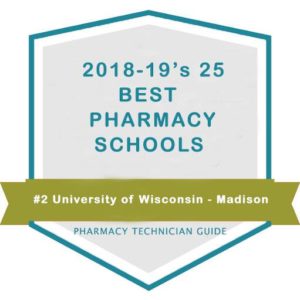 With our high-caliber students combined with teaching and research excellence, our PharmD program is thriving. The UW–Madison School of Pharmacy ranks second in the nation based on our NAPLEX pass rate, research activity, graduation rate, and quality of faculty in the 2018 Pharmacy Technician Guide.
With our high-caliber students combined with teaching and research excellence, our PharmD program is thriving. The UW–Madison School of Pharmacy ranks second in the nation based on our NAPLEX pass rate, research activity, graduation rate, and quality of faculty in the 2018 Pharmacy Technician Guide.
Our students are benefitting from a great return on investment, with six-figure salaries at graduation ($116,400 average in 2018) while having among the lowest tuition and student debt. And it’s an exciting time to be a pharmacist as the role continues to expand within the health care team, and the profession is among the highest paying jobs in America. Right after physician in first place, pharmacy manager and pharmacist are the second and third best paying positions, with health care professions accounting for half of the top 10.
Big leaps in research funding
There’s incredible momentum in our world-class research enterprise at the School of Pharmacy. Faculty have more than doubled funding from the National Institutes of Health (NIH) and other federal grants from $4.2 million to $9.5 million over the last two fiscal years (fiscal 2015-2017). Even bigger strides in non-federal grants were made—152% increase.
We’re continuing to accelerate that momentum as faculty collaborate on more team science projects and pursue more grant opportunities, including these latest wins:
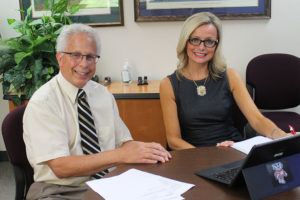
- Professor Beth Martin and Associate Professor Bob Breslow in the Pharmacy Practice Division will research how to optimize OTC labels for older adults in a grant from the U.S. Department of Health & Human Services’ Agency for Healthcare Research and Quality (AHRQ).
- Associate Professor Michelle Chui in the Social and Administrative Sciences Division received an R21 AHRQ to fund research on a health IT tool called CancelRx that aims to decrease medication discrepancies.
- The NIH’s National Institute on Aging awarded Professor Lingjun Li in the Pharmaceutical Sciences Division a R21 grant for her work in developing novel multi-faceted methods for large-scale characterization of citrullinated proteins for biological samples and its application to Alzheimer’s disease.
- Professor Weiping Tang in the Pharmaceutical Sciences Division received a R21 Exploratory/Developmental Research grant from the NIH for a new method in carbohydrate synthesis that could have potential applications ranging from cancer research to heart disease.
- The National Science Foundation selected Professor Seungpyo Hong in the Pharmaceutical Sciences Division for a grant to further his research to develop a new type of nanocarrier, drug delivery system, for more efficient cancer tumor targeting.
- Assistant Professor Jason Peters in the Pharmaceutical Sciences Division won a K22 Career Transition Award from the NIH, U.S. Department of Health & Human Service, and US. Public Health Service to continue his research in CRISPR-based functional genomics in pathogenic bacteria.
Building greater research strengths

As part of a top-tier research institution, the School of Pharmacy is at the center of scientific innovation and continues to create new knowledge that will improve human health and enhance patient care. Our latest endeavor is launching the School’s Wisconsin Center for Nanobiosystems (WisCNano) that will focus on drug delivery to enable more robust drug discovery on the UW–Madison campus. Headed by Professor Seungpyo Hong as the center director, WisCNano will pioneer novel methods based on nanotechnology to target drug molecules for specific sites of the body, which could have profound applications for cancer treatments.
In addition, the School is advancing precision medicine as part of the university’s cluster hire initiative that will focus more research on personalizing cancer treatment. A School of Pharmacy faculty position in pharmacogenomics is among the planned new faculty hires in the campus-wide cluster hire initiative. Our faculty expert in how a patient responds to drug therapies and the identification of genetic markers for medications will complement and support the other precision medicine cluster hires at the School of Medicine and Public Health in oncology, and at the Law School in genetic testing law and ethics.
Top faculty scholars and student thought leaders
As we build new centers of expertise and grow our external research funding, the School’s faculty continue to garner recognition nationally and globally.
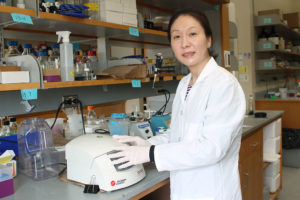
- Associate Professor Warren Rose in the Pharmacy Practice Division was just named a fellow of the American College of Clinical Pharmacy (ACCP), a prestigious honor for his exceptional performance in clinical pharmacy practice and research.
- The American Chemical Society (ACS) Division of Carbohydrate Chemistry selected Assistant Professor Jiaoyang Jiang in the Pharmaceutical Sciences Division as the most impressive early career scientist with the 2019 David Y. Gin New Investigator Award, a top honor in the field of carbohydrate chemistry from the world’s largest scientific society and leading organization for chemistry professionals.
- Professor Tim Bugni in the Pharmaceutical Sciences Division is honored with the 2018 Waters Award for Excellence in Natural Product Innovation, an international recognition that will be presented at the largest natural product conference worldwide and organized jointly by the five largest natural product societies around the world.
- At the American Association of Colleges of Pharmacy (AACP) conference, Associate Professor Susie Barnett and Assistant Professor Ed Portillo in the Pharmacy Practice Division won the Laboratory Innovation and Teaching Excellence Award from the Laboratory Instructors Special Interest Group.
We’re also proud of our talented students who are shining examples of strong scholarship. Jhewelle Fitz-Henley is a second-year PhD candidate in Pharmaceutical Sciences and conducts research as part of Assistant Professor Jennifer Golden’s lab. Fitz-Henley received a 2018 National Science Foundation (NSF) Graduate Research Fellowship Program (GRFP) Fellowship.
Over in Professor Lingjun Li’s lab, Kellen DeLaney, a PhD dissertator in Analytical Chemistry, was selected for a NIH National Research Service Award (NRSA) Predoctoral (F31) fellowship award.
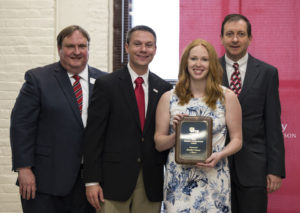
Tony Tam (PhD ’18) in Professor Glen Kwon’s lab, coauthored a paper in ACS Nano on the development of a stabilized form of common chemotherapy agent gemcitabine that inhibited tumor growth in mice more effectively than standard gemcitabine.
Among our PharmD students, Heather Stoner (PharmD ’18) earned the Student Achievement Award from the Pharmacy Society of Wisconsin. Elizabeth Langenstroer (DPH-3) was awarded a national Kappa Psi Pharmaceutical Foundation Scholarship. Also, the national executive committee of Kappa Psi, the oldest and largest professional pharmacy fraternity, named the UW–Madison School of Pharmacy chapter as “Top Performing”, landing in the top 30% among more than 100 chapters in North America.
Pharmacy Badger alumni movers and shakers
With 135 years of producing the best pharmacy talent in the state, it’s no surprise that our School of Pharmacy alumni won nearly all of the awards at the 2018 Pharmacy Society of Wisconsin (PSW) annual meeting. PSW honored Diane Erdman (PharmD ’97) with the Pharmacist of the Year award for her work as manager of education and clinical pharmacy programs at Ascension/Wheaton Franciscan, St. Joseph in Milwaukee. The PSW award for Young Pharmacist of the Year went to Barry McClain (MS ’11), manager of pharmacy information systems at Aurora Health Care in Milwaukee. Susan Kleppin (BS ’85), director of pharmacy at Chartwell Midwest Wisconsin in Middleton received the PSW Distinguished Service Award. PSW selected Julie Dagam (BS ’98, PharmD ’99), director of the PGY1 pharmacy residency program at Aurora Health Care in Milwaukee, as the winner of the 2018 Excellence in Innovation award.
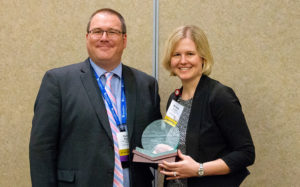
Presented at the PSW annual meeting, the School’s Pharmacy Alumni Association (PAA) honored Franklin “Rocky” La Dien (BS ‘77), area healthcare supervisor with Walgreens, as 2018 Alumnus of the Year. Melissa Forbes (PharmD ‘10), clinical pharmacist with Gundersen Lutheran Medical Center in La Crosse, won the 2018 Young Alumnus Practitioner award.
Our alumni preceptors are the heart of the School’s PharmD experiential learning program of Introductory Pharmacy Practice Experiences (IPPEs) and Advanced Pharmacy Practice Experiences (APPEs). For precepting excellence, Paul Jest (PharmD ’11), pharmacist at SSM Health St. Clare Hospital in Baraboo, received the 2018 IPPE Clinical Instructor of the Year Award.
Living the Wisconsin Idea
In keeping with the School’s service and outreach mission, we are working in numerous ways in communities across Wisconsin to make a difference. Associate Professors Warren Rose and Susie Barnett in the Pharmacy Practice Division, with Laurel Legenza, interim director of global health, are developing the first interactive map of antibiotic resistance in the state. They are now seeking health systems project partners to participate in the UW Antimicrobial Resistance (AMR) Tracker initiative. The AMR tool will make resistance data more accessible to care providers and help physicians identify the right antibiotic the first time, based on potential resistance risks in a patient’s home region.
In another collaborative effort, Michelle Chui, associate professor in the Social and Administrative Sciences Division and director of the School’s Sonderegger Research Center, is building a pharmacy practice-based research network called PearlRx with pharmacists throughout Wisconsin. The research collaboration will enhance medication use and safety in order to improve patient outcomes as well as look for ways to improve pharmacy practice that will increase work satisfaction among pharmacists. Interested pharmacists can participate in PearlRx by simply opting in for “Research Network Participation” in their PSW account profile under “Demographics”.
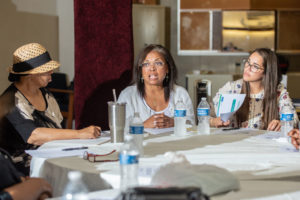
Professor Eva Vivian in the Pharmacy Practice Division is improving the public health of an underserved Milwaukee community with her work in launching Peers Empowering Peers, a new community-based diabetes management and prevention program for African Americans. To help address health care disparities among communities of color, Vivian trains peer coaches who help empower their fellow African American community members in Milwaukee with information and strategies for healthy lifestyles that prevent and manage Type 2 diabetes. She’s making an invaluable impact that exemplifies the Wisconsin Idea.
Because that’s what Pharmacy Badgers do.
On, Wisconsin!
Steven M. Swanson
Dean